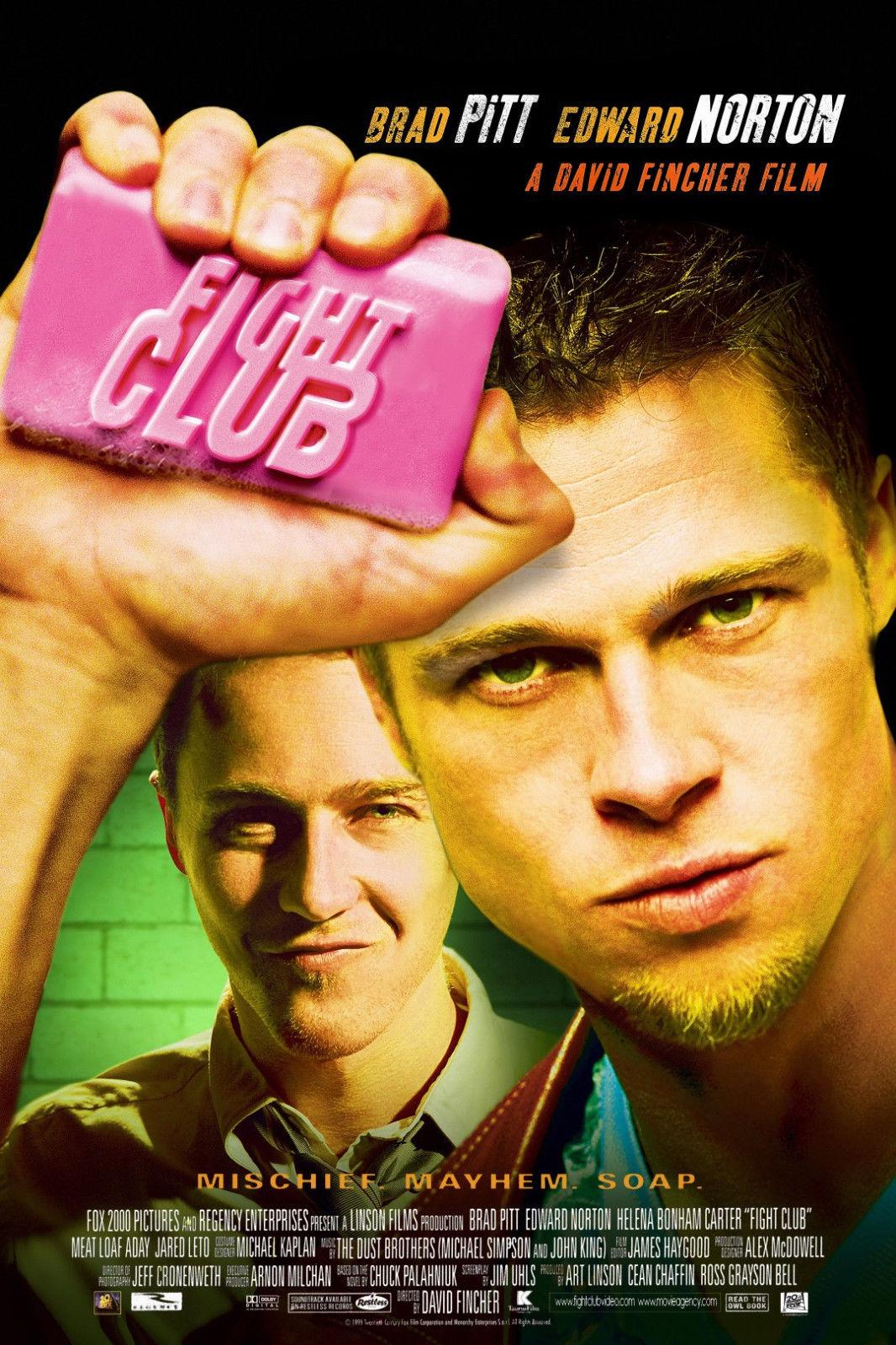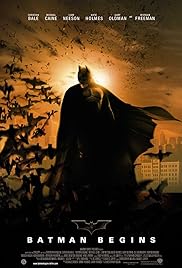Bit of a sidebar here: I went back to our first ever movie draft to make sure I wasn't retreading old ground, and two thoughts occurred to me:
1: I have no clue why I never picked Back to the Future before it was swiped by someone else in the 6th round. What could I possibly have been thinking? Sure, my first two picks make sense, but after that I skipped a top ten favorite since childhood in favor of some novelty picks? Even if I was trying to "appeal to the voters" with some popcorn blockbusters, Back to the Future is exactly that. So, what's the deal past me? I ... got nothing.
2: I should have never lost to Brick in the playoffs. His list was trash.
Moving on.
I've had a rather tumultuous relationship with my next pick. When it was first released, I refused to watch it, thinking it was little more than machismo frat/jock fightporn. After a friend finally convinced me to try it with the promise of a 'twist ending,' I'd swung around the other way thinking it the greatest narrative put to celluloid, spending my first year in college preaching its gospel unironically.
I then soured on it again, probably as a backlash to its growing popularity, especially within the groups I had initially labeled as its target audience, then distanced myself from it calling it exploitative, pseudo-philosophical, self-important and aggrandizing, overrated white male rage doctrine, and I hadn't actually seen it in years.
But the time away allowed me to approach it with fresh eyes and now I'm seeing it as something of a fairly clever satire of all the negative labels I'd spewed upon it earlier.
Or maybe not. What's truly exceptional about this film is that its subtle and sublime versatility hold up to so many interpretations. They are all simultaneously true and untrue at the same time. It is the Schrödinger's Cat of American pop cinema - both shallow and deep depending on who's viewing it and what they mine from its content.
Or maybe it's a Rorschach Test.
Either way, it's my second pick.
F is for ...

Fight Club (1999)
I wanted a smaller graphic, but it seems everything about this movie has to be oversized and in your face. Anyway ...
One of the more interesting interpretations I've read about this movie is that its a twisted vision of an adult Calvin and Hobbes.
"Jack" the Narrator is an adult Calvin disillusioned with society and his role in it. Tyler Durden is Hobbes, the imaginary pet tiger who philopshizes his nihilistic views of humanity. Marla Singer is a grown-up Susie Derkins for whom Calvin can't realize his seething hatred is actually repressed attraction. Robert "Bob" Paulson is bully Moe whose overt alpha masculinity eventually turns on him in the form of HGH injections inadvertently upping his estrogen levels. Its a fairly hilarious and brilliant read on the symbolism.
But more importantly, it's indicative of why this film has found a second life within my own sphere. The "Capitalism has Emasculated the American Man!" narrative is legitimately only the excruciatingly shallow surface-interpretation of its message, and admittedly where many, myself included, get caught. If you grow out of that particular brand of mouth-foaming, then as a matter of course, you end up having to leave the film behind.
Happily, I would later discover that interpretation is aggressively narrow, and the film works as a criticism of those very beliefs as well, wondering aloud if those who have found themselves unfulfilled only have manufactured violence as an outlet. Given how the story ends, it would seem the film itself is saying a punctuated no.
And regardless, even if the message of the movie is ultimately irrelevant, as I'm sure it is to most simply looking for a bit of escapism, it is really rather special as that too. The dialogue is among the best in film, with quotable (if raunchy) lines throughout. I'd put it a single tier lower than Casablanca in that department. The Easter eggs of Tyler popping up before he's introduced are still fun long after the "twist" has been revealed. Philosophy aside, when it comes right down to it, Fight Club is entertaining. Just as fun in a "don't think about it and eat popcorn" kind of way as any other blockbuster would be.
I'm glad I've rediscovered it.
I think Fight Club is still one of the most misunderstood films of the past 30 years. It was dismissed upon it's initial release as a childish ode to violence and lost money in it's initial theatrical run because the studio didn't know how to promote it and the critics didn't know how to define it. While it ultimately did find a large audience as a home video release, the fervor with which it's devotees (myself included) preach it's brilliance has made it difficult for anyone who hasn't already been initiated to judge it objectively.
If a movie can simultaneously be cited in arguments for the liberation of the "oppressed" white male in modern society and also for why that whole movement is reductive and ultimately self-destructive then that's a clue there's a lot more going on beneath the surface than just one didactic argument. I think what the film's authors are interested in is exploring why so many people in our society are short-circuiting and acting out in violent ways. And yeah there are no easy answers given here but would you trust the film if it wrapped up with one? Compounding the problem is that it's visual style is very of it's time with the in-your-face jump cuts, whip pans, hidden frames, and self-aware narrator who breaks the fourth wall throughout. That puts it in the very ironic position of being too far ahead of it's time on a thematic level to connect with an older audience in 1999 and too stylistically anachronistic to connect with a younger audience in 2020.
If I could make an argument on it's behalf as an important cultural document though I would start by saying that it should be very clear from the first 5 minutes that this is intended as a parody. It goes to a lot of dark places but it's goal is never to celebrate the violence and anarchy espoused by the charismatic Tyler Durden character but to put our society under a microscope and really turn it inside out. Why do we keep trying to find happiness by buying things long after we realize that it doesn't work? Why do so many people spend the majority of their lives toiling away in jobs that they hate? Why do so many personal relationships fall victim to our fears and insecurities which we cling to even as they pull us further and further apart? In a world that has increasingly rejected us as individuals and told us that our primary value to society is as consumers, how can we walk this back and find meaning and purpose again?
The issues the protagonist is struggling with have only become more relevant over the last 20 years. It's a movie abut self-liberation -- of rescuing yourself from the mental trap of allowing your own enculturation to slowly destroy you. What drives the Jack character to the insanely bonkers idea of blowing up his own life (literally and figuratively) is the realization that being the nice guy who does what he's told and brushes everything off with self-effacing sarcasm has led him nowhere in his life. He's looking for the courage to pursue a life of his own choosing and the whole existential rabbit hole that he descends down into is the result of his desire for freedom crashing up against 30+ years of mental reinforcement telling him that the happiness he seeks is just one promotion, one new car, one designer coffee table away. Even when he finds a love interest who is in many ways his own mirror image his first reaction is to reject her as repulsive because that's how he views himself. When you look back on the movie, almost all of it takes place inside his own head. That's where the real battle is being fought and it's life and death in the clearest possible way -- he's either going to go on living as if he were dead or he's going to have to rewire his brain until he can be truly alive for possibly the first time in his life.
If I were to find one fault in Fight Club it would be that the point of view of both the novel and the film are very male-centric. I think it's fair to ask though whether dulling the edges of this very personal coming-of-middle-age story by trying to graft in universal appeal that doesn't really belong there would have undercut the effectiveness of its message. Based on the rules of the draft I can't mention it by name but there's a movie that came out in 2003 which I've always considered to be a female-centric companion piece which fills in a lot of the areas that Fight Club leaves out (for the very obvious reason that they just wouldn't have occurred to a male author). And it's okay if a movie comes from a specific point of view, in many ways I think it's even preferable. You can make up in depth what your story lacks in breadth.




















